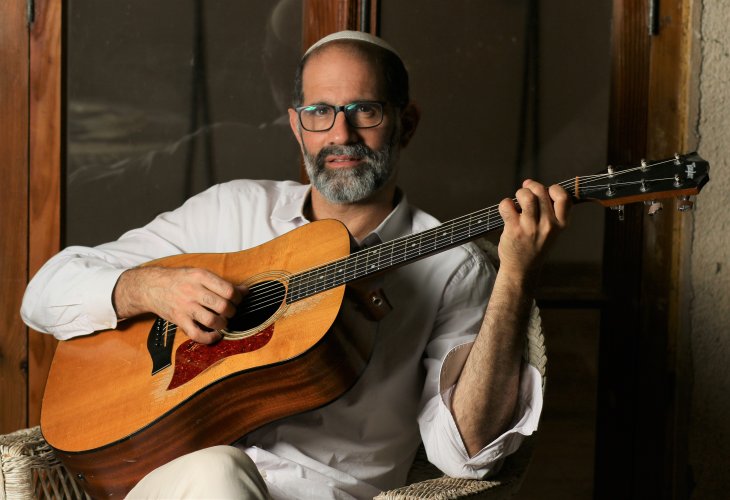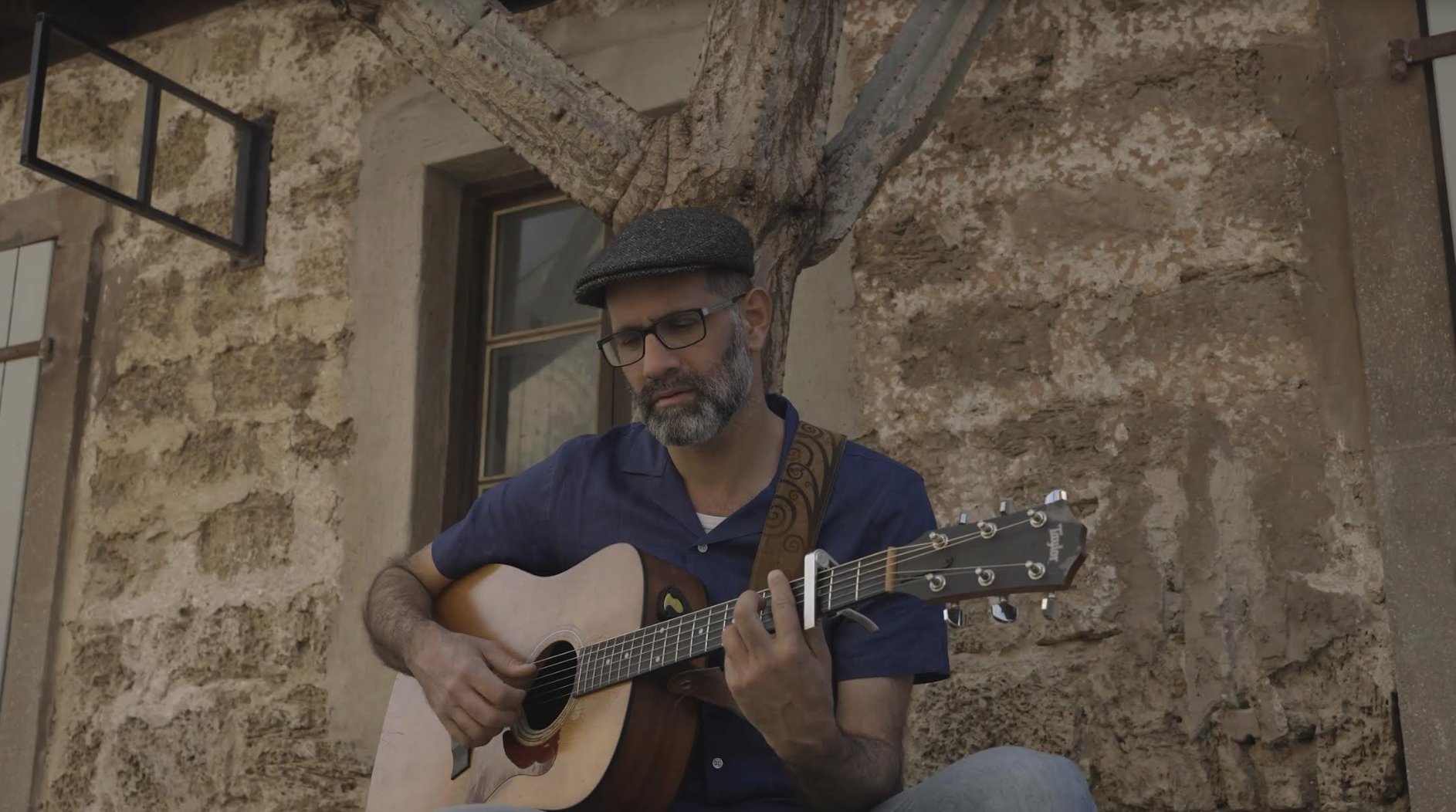Today I Know What's Right for Me and I No Longer Try to Appease Everyone
Yoni Ganot, a pioneer of the renewed Jewish music, reflects on 25 years of creation. In this interview, he talks about the pursuit of success, the miracle that led him out of Tel Aviv, and his final months with his dear friend Zevulun Moshiashvili.
 Yoni Ganot (Photo: Asaf Yazd)
Yoni Ganot (Photo: Asaf Yazd)Yoni Ganot, one of the first artists in the emerging genre of renewed original Jewish music, now widely recognized and loved, is summing up 25 years of activity. Although it's hard to believe, this prolific genre, now filling major stages across the country, barely existed thirty years ago. Ganot, along with a few other artists, including Aharon Razel and Adi Ran, were pioneers. They laid the foundation for the wave of faith-based rock and pop that has swept the Jewish world over the last decade.
As someone who was there almost from the start, how do you think the renewed Jewish music that began about 30 years ago differs from the music in this genre being created today?
"First, I want to say that even today, there is a lot of quality and touching Jewish music," says Ganot (50), married and a father of four, living in Moshav Tarom, musician, and educator. "One difference is that in the early years, this was very authentic and not commercial at all. People who made this music back then were kind of 'crazy about it,' like people who were struck by lightning. Initially, it was really on the fringes, and gradually people gathered around it. Today, however, it has become much more commercial. There are already so many paths marked out, and many things sound very similar. It's clear that even today there are artists who innovate, but it's much harder. There's a great blessing in the fact that many artists engage in this creative style, but at the same time, there's inevitably less honesty and uniqueness."
 (Photo: Ohad Elimelech)
(Photo: Ohad Elimelech)You said only a few were engaged in this music at that time, how did you get into it?
"Before my army service, I studied at the Har Etzion Yeshiva, where suddenly I wanted to create music. I started playing music in middle school, but I began to create music around the age of twenty. I studied very seriously at the yeshiva, and occasionally I would borrow a guitar from an American friend and start playing around with it. Very quickly, I began writing songs. Musically, they drew inspiration from styles that influenced me both in Israel and abroad, especially a lot of British music. The themes of my writing were mainly around insights and thoughts that came from Jewish philosophical books I studied at the yeshiva, especially from the teachings of Rabbi Kook. Of course, my experiences in faith and a variety of life experiences also influenced my writing.
"I invested a lot in it, but the texts I wrote seemed strange to most people—and were wrapped in rock music. We had an audience that was really enthusiastic about it, but the mainstream on both sides didn't know how to contain it. For the secular world, these were too spiritual and religious texts, and for the religious world, it sounded too secular, philosophical, and rebellious.
"It wasn't easy living with these complexities, but I felt this was my place. I felt good living on the seam line. In 1995, I went on a mission among Russian Jews, and in the preparation course for the mission, I was with secular guys. We argued quite a bit, and I saw that I was cut out to be a bridge between secular and religious, and music helped me with that. After six years in yeshiva, I decided to look for a place in Tel Aviv to do outreach, but not from a place that says 'all the truth is with me'; rather, I simply wanted to create a space for people interested in Judaism who wanted to know it in a good light. Thank God, we managed to set up such a place, and I was there for two years, and during that time, I studied music at Rimon. Back then, there weren't religious music schools, and that was the only option for those who wanted to professionalize in the field."
Lights and Shadows
"At that time, I performed a lot with the band 'Between the Sunsets'," adds Ganot, "and we were quite unique in this already unique genre. Most who were active in this scene were baalei teshuva, and we were national-religious. More than once, people looked at me as an odd bird, but I thought it was important, so I kept going. Along the way, there were quite a few difficulties, but I saw that many good songs were accumulating, and I felt there was a new and important message to bring to the people of Israel, and I couldn't stop. I was like an arrow guided by a target; every penny I had was invested in music because I loved it very much and believed in its importance."
Speaking of 'Between the Sunsets', your second album was less successful than the first. Why do you think that happened?
"The first album was more naive and raw than the second, but maybe that's what caught people. The second album is much more polished, and we invested more into it, but it's also more melancholic. Yet, I can say that over the years, the pursuit of success has balanced with other things. At age 37, *Hashem* had mercy on me, and I finally got married, and the strong desire to succeed in my career blended with other aspects like my personal service to *Hashem* and, of course, the desire to invest in my family, which for me is above all. At first, I thought of staying in Tel Aviv, but thank *Hashem* my wife got me out of the mess I was in, and I left the city. My wife had just returned from ten years in the United States to build a home in holiness, and as soon as she arrived back in the country, we met. We had a special performance for Tu B'Av with Meir Banai and Rabbi Fruman, and that's where we met.
"At that time, I was deeply absorbed in Tel Aviv, and my wife showed me the way out. She was more directed than me toward a proper Jewish home without compromises, and thanks to her, I got out of those mixed-up worlds. Although I am still in touch with people from all walks of life, and my songs still touch a variety of people, today I know what's right for me, and I no longer try to appease or ensure my songs pass smoothly with everyone. I create music as I see fit, and whoever connects with it is great.
"Moreover, another channel through which it's important for me to have an impact is the world of education. I serve as the rabbi of the 'Tachkemoni' elementary school in Bat Yam, where there are many outreach activities. It's defined as a religious school, but most students come from traditional homes, and there's a lot to do. Thank *Hashem*, I see the connection and positive impact of my activities at school and my music on the traditional families."
Goodbye, Friend
About a month and a half ago, the actor and baal teshuva Zevulun Moshiashvili passed away. During the last year of his life, Ganot was one of the people closest to him. "I met Zevulun in Tel Aviv," Yoni recounts with a tone of sadness. "It was during a period I was living there doing outreach. My friends and I were national-religious, and we connected well with the baalei teshuva. We would eat together, have Melaveh Malkas, perform, and more. Zevulun had a special joy, and I quickly connected with him. We stayed in good touch, and I involved him in various things I did in music.
"Zevulun was ill for quite a few years, but he really concealed his medical condition, and we didn't know what was happening with him. On the last visit to him, we realized there was a serious problem, and from that moment, we were very closely with him, trying to assist however we could. We tried to do everything possible, but unfortunately, we couldn't save him. It was a very difficult period, but we accompanied him with much love to the very end. We really wanted it to succeed, but *Hashem* willed otherwise, and I pray that we can take the incredible good he had and pass it on."
I assume such events can provoke big questions in a person, like what have I accomplished so far, and where do I still want to go.
"Yes, it definitely stirred up several thoughts. There were years when I very much wanted to make a big breakthrough, for example, with 'Between the Sunsets', we were the first in the genre to hire a PR firm and really invested in marketing our music. But still, it's a matter of faith—you try to understand what *Hashem* wants, why something succeeds or not, and sometimes it goes to places of self-blame. However, today I'm in a different place, a place of closure and self-acceptance. What happened, happened, and that's how it had to be. I'm happy with my part in the revolution that occurred in original Jewish music, and I'm looking forward to seeing what *Hashem* will still bring through me to illuminate the world. I'm more focused on cracking the right formula for me and reaching places I haven't been yet. The younger generation is more goal-oriented even in this channel of breaking barriers; they've managed to reach non-religious audiences, which we didn't succeed in doing, and they deserve all the credit.
"And in general, within this whole realm, there's often a difficult dilemma about how much to invest in family versus music. You can decide to be more with the family, but if you don't push the music, it becomes less economically viable, making it much harder to be with the family. They really influence each other. But basically, even after all the deliberations and efforts, you really see how everything is in the hands of *Hashem*. There were songs I promoted heavily that didn't succeed, while on the other hand, such as the song 'Yismach Libi', which I didn't promote or push at all, yet it still receives hundreds and sometimes thousands of views daily on YouTube. When such things happen, you understand that *Hashem* manages the world, and what you invest in doesn't necessarily succeed. Perhaps this is also one reason why today my dreams are mainly to develop in the Torah realm, giving more lessons, strengthening myself and others. I believe it will also positively impact my music, and so I can continue my path in serving *Hashem* for the sake of the people of Israel and the eternal values that have accompanied them for so many years."

